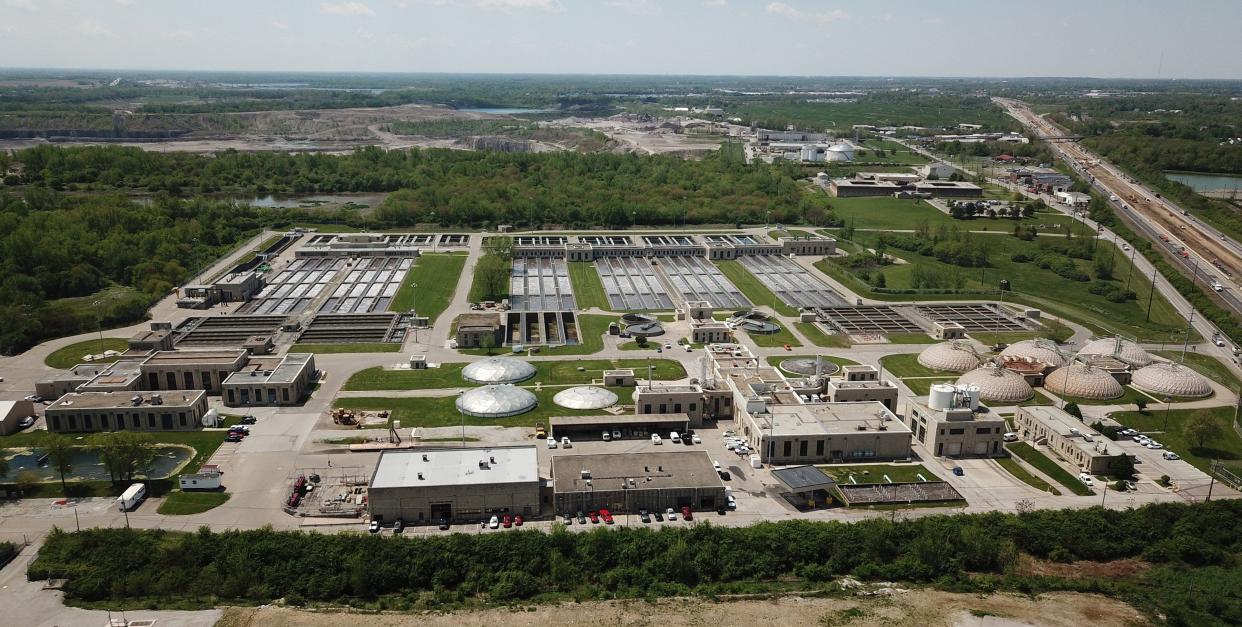Columbus raises 2023 water, sewer, stormwater rates, extends Downtown taxing district term

Columbus City Council on Monday approved increases to water, sewer and stormwater rates for 2023 that are expected to cost the average city residential customer an additional $56 more per year — more for those living outside the city who get their water from Columbus.
The council also voted to extend by three more decades until 2068 the city's Downtown "tax increment finance" or TIF district, which funnels property tax revenues from new development Downtown to support city spending in the Downtown district for projects such as parking garages, streets and other improvement expenses.
In approving the water and sewer rate increases, city officials said they are mindful that high inflation is battering household budgets.
The increased rates represent a 4% jump for water, 5% for sewer and 2% for stormwater. Customers outside of the city don't pay a stormwater charge. However, suburban customers pay a 30% premium for their water, and Franklin County residents not in a city pay a 50% premium, officials said.
An average city household that uses 30 "ccf's," increments of a hundred cubic feet equal to 748 gallons of water, currently pays $316.24 per quarter. Those residents are estimated to see their total bill increase $14.07 per quarter, or $56.29 next year.
Low Income Discount program participants, who get 20% off their bills, will see an overall increase of 4.42%, according to the ordinance.
Low-income, senior citizens and others with concerns about paying their bills were encouraged by city officials to familiarize themselves with all the numerous assistance programs available by going to the city's website: https://www.columbus.gov/payassist.
"These increases allow us to cover our operating expenses and debt-service costs related to our $4 billion capital improvement program," said Jonathan Lee, deputy director of fiscal operations for the city Public Service Department. "We understand that rate increases are not popular, especially in this time of rising inflation."
Columbus City Council also extends Downtown TIF, OKs tax abatement
The city's Downtown TIF district isn't scheduled to expire until 2038, but the city council on Monday voted to extend that by 30 years to 2068. While Columbus City Schools continue to receive their normal property tax revenues under the TIF, money is taken away from other non-school agencies such as the Franklin County Board of Developmental Disabilities, Children Services, Columbus Metropolitan Library, Columbus Zoo and Aquarium, and others.
To the extent that those agencies losing money to the TIF must raise property tax rates because of the diversion, those tax increases get shifted onto the owners of other properties that are not in a TIF zone.
"The people of Columbus and our neighborhoods will never prosper equally until this city stops robbing those in need of their rightful public dollars," Joe Motil, a long-time critic of the city's development incentives, told the council in opposing the extension ordinance.
Development Director Michael Stevens said the geographic boundaries of the Downtown TIF aren't changing under the extension. They generally include an area from I-70/I-71 to the Arena District, and between the Scioto River and I-71.
The time extension is authorized by a change to state law in 2019. The fund has mainly been used in the past to build and maintain city-owned parking garages Downtown, Stevens said. Going forward, a revised list of qualified expenditures will now include Downtown public art, he said.
In other action Monday, the council approved a 10-year, 75% property tax abatement to Denver-based Cologix, which proposes to build a 250,000-square-foot data center on 7.5 acres of undeveloped land north of I-270 and east of U.S. 23.
Under the deal, Cologix is projected to save $21.5 million in property taxes over the 10 years, while the city will gain $375,000 in income taxes paid by the firm's employees, which are to include 15 new full-time positions.
Theodore Decker: Columbus leaders' rosy view of corporate tax breaks ignores ugly realities
Motil told the council the tradeoff was a "paltry" gain for the city in comparison to what is gained by the firm, which he said is owned by equity investment firm Stonepeak, which has $51.7 billion in assets. He called the deal another example of "corporate welfare and the Columbus Way."
"A company like Cologix has operations all across the country, and has to make decisions every day where they want to continue to make investments," Stevens responded. "By using this incentive tool to encourage that investment here in the city of Columbus, we're making sure our neighbors stay employed."
Worthington City Schools will realize an additional $4 million in property tax over the life of the deal from the 25% not abated, Stevens said.
wbush@gannett.com
@ReporterBush
This article originally appeared on The Columbus Dispatch: Columbus is hiking rates for water, sewer, stormwater

